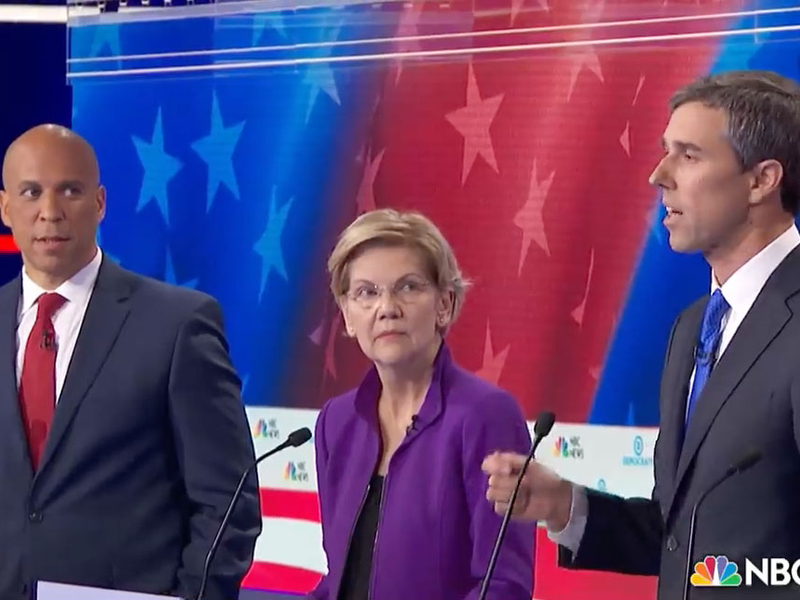When Beto O’Rourke and Cory Booker try to one-up each other by speaking Spanish during a nationally televised debate, do voters perceive it as respectful or pandering?
In the first set of Democratic presidential debates, televised in late June, both former U.S. Representative O’Rourke and U.S. Senator Booker used opportunities to connect with Hispanic voters in Spanish—as did former Secretary of Housing and Urban Development Julián Castro, the only Latinx candidate in the race.
Despite being panned by some pundits and turned into internet memes, the candidates’ efforts to speak Spanish are generally seen as a positive by Hispanic Americans.
Some 42 percent of Hispanic Americans said candidates speaking Spanish during a televised debate was “respectful,” according to a survey conducted by research firm YouGov after the first set of debates. By comparison, 31 percent of Hispanics said such language use was “pandering.” Another 28 percent said they didn’t know.
White Americans don’t view it the same way. Only 25 percent of white respondents said using Spanish during a debate was respectful, while a whopping 52 percent described it as pandering to the audience. Some 16 percent of white Americans said it’s never acceptable for a U.S. politician to speak in a foreign language.
In general, Hispanics see fluency in a second language (other than English) as a positive quality in a presidential candidate; 61 percent described speaking a second language as either very or somewhat positive for a candidate.
Hispanics also are more forgiving of politicians who make a mistake while speaking in a second language; 40 percent said it’s acceptable for U.S. politicians to attempt to speak in a foreign language even if they make a mistake, compared to 35 percent of white Americans and 23 percent of black Americans.
In addition to the 42 percent positive feelings about using Spanish during a debate, 53 percent of Hispanic respondents told YouGov that candidates speaking Spanish while campaigning in a predominantly Spanish-speaking area was respectful. That was echoed by both white and black Americans.
“The use of Spanish seems to be more personal or authentic when a candidate is coming into their world,” says Linley Sanders, data journalist for YouGov.
The perceived value of language skills strongly correlates to political viewpoint, according to YouGov research.
While 73 percent of Americans who describe themselves as liberal (and 86 percent who describe themselves as very liberal) say a second language is a positive for a candidate, only 46 percent of Americans who say they’re conservative (and just 36 percent of those who call themselves very conservative) view it the same way.
Respondents who said they voted for Donald Trump in 2016 were among the most critical of candidates speaking in a foreign language. Some 74 percent of Trump voters said it’s never acceptable for a U.S. politician to speak in a foreign language, and 75 percent said doing so in a televised debate was pandering to the audience.
Learn more: Ad Age Hispanic Fact Pack 2019
Want to know more about the Hispanic market?
Get the latest stats and facts on Hispanic marketing, media, agencies and demographics in the 16th annual Ad Age Hispanic Fact Pack.
Download digital edition of Ad Age Hispanic Fact Pack 2019. Digital edition available to Ad Age Insider, Editor’s Circle and Datacenter subscribers; also can be purchased for $49.
Ad Age Hispanic Fact Pack 2019 was bundled with Ad Age’s Aug. 12, 2019, print edition. Order print copies at customerservice@adage.com or call 877-320-1721. Outside the U.S., call 313-446-0450.
Read more: adage.com
